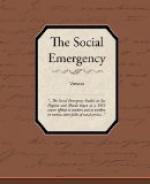With the sanction of this double standard, tacitly accepted by society, thousands of prostitutes have been harbored and protected. What shall we do with them? We may drive them out of certain districts and certain houses, and even certain cities, but they are still with us, and we are responsible for them. If they are denied resorts where men seek them, they will seek men. Most of them are unable, without special training, to earn a living in any other way, and many of them would not if they could. A majority are mentally defective and should be wards of society. Any plan which fails to take care of these women—adequately, permanently, and humanely—ignores one of the greatest of the problems which history, with the sanction of society, has made a factor of the present emergency.
The medical phase of the present situation is not often ignored, except by those who hold that there is no such thing as disease. All countries are alarmed over the prevalence of venereal infection. Definite information, however, concerning the extent of these diseases, the sources and conditions of contagion, and the complications and results, is not to be had; because society still persists in treating venereal diseases as not subject to public registration and control, in spite of their terrible attacks on tens of thousands of innocent victims.
The fear of contracting disease has long been used in attempts to promote a single standard of chastity. Such fear has no doubt played its part and will continue to keep many prudent men away from prostitutes. But in looking forward to the work of the next generation, we must face the need of higher motives than the fear of disease, for science may at any time discover positive safeguards against contagion, thus diminishing one of the factors of the present emergency and by the same stroke accentuating others.
Of the economic phases of the emergency, there are some which directly affect the wage-earner. One is the failure of wages to keep pace with the higher cost of living; another is the increase in the number and proportion of wage-earning women and the resultant keenness of competition for places; another is the fact that women workers are for the most part unorganized and unprotected; another is the occasional effect of supplementary wages of vice in lowering the wages of women in industry; still another is the constant temptation of shop-girls to imitate their patrons’ vulgar displays of finery. But of all the economic factors contributing to the moral breakdown of girls, the most general and inexcusable is the failure of our public schools to provide vocational training, although it is certain that above fifty per cent of all girls leave the schools to become wage-earners. Failure to gain a living wage is undoubtedly one of the causes, though seldom the sole cause, of the first delinquency of some girls.




